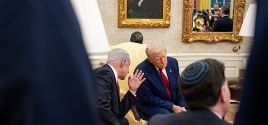Police let informers get away with murderBy SHAWN POGATCHNIKSeattle Post-Intelligencer Jan. 31, 2007 |
Popular 
NYT: Trump Ended War With Houthis After They Shot Down U.S. Drones, Nearly Hit Fighter Jets

Ben Shapiro, Mark Levin and Laura Loomer Warn of Foreign Influence... From Qatar

Trump Advisor to Washington Post: 'In MAGA, We Are Not Bibi Fans'

Trump Cut Off Contact With Netanyahu Over 'Manipulation' Concerns, Israeli Reporter Claims

Trump Praises Houthis' 'Bravery'
 BELFAST, Northern Ireland -- An elite anti-terrorist unit let Belfast outlaws get away with murder in exchange for information, but its officers will not be charged because they covered their tracks, according to an investigation published Monday into police spying on a Protestant gang. The findings of police Ombudsman Nuala O'Loan, the Roman Catholic watchdog for the mostly Protestant police force, sent shock waves through a peace process that depends on building Catholic support for the police. Her report, the product of a 3 1/2-year investigation, found that the police force's Special Branch intelligence arm covered up at least 10 killings from 1993 to 2000 involving Ulster Volunteer Force members who were being paid for tip-offs. The Special Branch was abolished in 2003 as part of a reform plan that favors the recruitment of Catholics. The report was published just days before Sinn Fein, the Irish Republican Army-linked party that represents most Catholics, is expected to vote to begin supporting the police. That long-unthinkable step would follow the IRA's 2005 decisions to renounce violence, disarm and promote the revival of a Catholic-Protestant administration, the central goal of Northern Ireland's Good Friday accord of 1998. Sinn Fein leader Gerry Adams said evidence of collusion, far from fueling Catholic hostility to cooperation now, should demonstrate why his party needed to get involved with the police and "stamp out bad policing." O'Loan said her investigators interviewed about 100 former and current officers, many of whom were helpful. But 40 others -- including senior former commanders of Special Branch -- refused. "Others, including some serving officers, gave evasive, contradictory and, on occasion, farcical answers to questions. On occasion, those answers indicated either a significant failure to understand the law or contempt for the law," her report found. O'Loan said Special Branch officers suppressed forensic evidence and didn't follow up leads that pointed to involvement of their Ulster Volunteer Force informers in at least 82 crimes. Her report did not identify any informer by name. O'Loan said British state prosecutors will not press charges against any former Special Branch officer because of insufficient evidence of collusion -- effectively, because the officers themselves had failed to document their undercover work or had hidden or destroyed key files. Irish Prime Minister Bertie Ahern said this wasn't good enough. He said the report "paints a picture of despicable past behavior. It is essential that justice be done, and be seen to be done, in these cases. In the face of such a damning report, follow-up action and reassurance is essential." |



